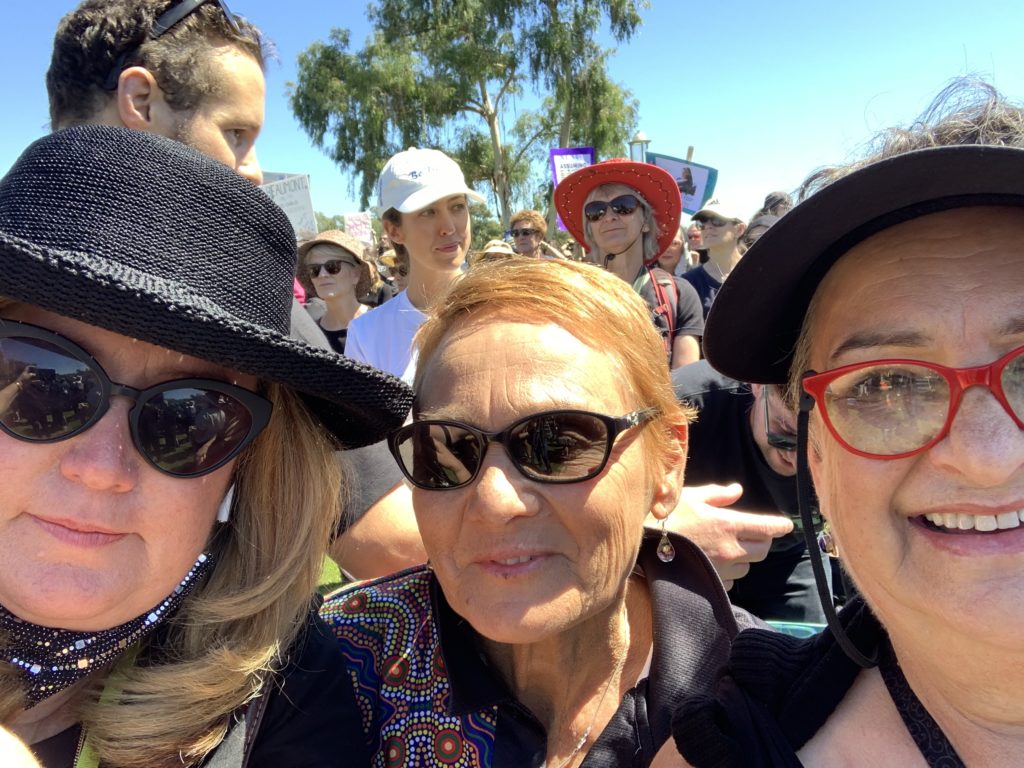
Proud Muruwari woman Suzanne Clapham tells her March4Justice story.
As a Muruwari woman, one of five sisters in a family of seven, as a mother of three and grandmother of four, as a retired high school principal, it was my moral and imperative responsibility to finally speak out and make a stand on what I have witnessed as a growing scourge in Australia.
I lived through (as a child witness) the wonderful social upheaval of the 1960s, I experienced the hope and exhilaration of the ‘70s and ‘80s where everyone seemed to be striving for a better Australia, where we participated in momentous social marches and events and saw significant social improvement. I believed in the rebuilding and restructuring of the ‘90s where I taught, as an English teacher, about every individual’s responsibility to make this world better socially, environmentally, politically and morally; everyone was on-board, everyone agreed that we were as a Nation improving, maturing, and sharing. We talked about eliminating the bomb, racism, hatred, the glass ceiling and poverty.
By the 2000s I was an educational leader always fighting for equality of every type, but notably for women (and especially Aboriginal women) where I never gave up hope; reflected in hundreds of speeches I made to students; that we were on a trajectory of social improvement and justice for all. But somewhere along the line – and I truly can’t recall when – Australia began to slip backwards. When did our attitude change? When did it become so hard to be a woman in Australia?
As I reflect, I feel it was a slow and gradual decline where the fight for women’s rights, so pertinent, topical and important, declined along with Aboriginal rights. The 1991 Royal commission into Aboriginal Deaths in Custody gave us such hope that we were entering a more equitable world, but the most recent statistics don’t lie, they tell a shocking story of failure; the rate of death for Indigenous women in custody is higher than the corresponding rate for Indigenous men which is appalling. Aboriginal women living in rural and remote areas to experience domestic violence compared to white peers are 45 times times more likely to be a victim of domestic violence (Gordon Inquiry report 2001). Aboriginal women have the ignominious privilege of being on the very lowest rung of the Australian social ladder.
I was dealing through the mid 2000s as an educational leader, more misogyny among boys, more angry men and most definitely more sexual abuse trauma in girls; although the White Ribbon movement taken up by wonderful men in our school community continued to give me hope. Phone calls to counsellors, FACS, police and support agencies took up far, far more hours than they used to. The slow layered trauma you experience as an educator over many years takes its toll, as it must with police and support agencies. The affect of sexual abuse has a ripple effect on whole fabric of our society, it affects EVERYONE.
I believe that social media and soft-porn misogynist music videos have a lot to answer for in shaping our young girls’ world view and their objectified and sexualised image of ‘self’. By the time I retired I was horrified by the sheer acceptance that this was young Australian women’s lot! Rape is about power not necessarily sex, we urgently need to reassess the right to an individual’s power over another human.
My four sisters and I have been privileged and well educated with high expectations for success and it is now our time to speak up, stand up and say ‘No More’. This event gave me purchase to vent about the terrible decline in the attitude towards women that I have personally witnessed and experienced. I travelled to Canberra from Wollongong with one of my sisters, but also with the support of my three sisters who were working. Culturally I travelled with my magnificent strong Aboriginal sisters in my heart because they, of all the victims in this reality, are the most affected, the most vulnerable and yet have the most to gain through the success of the March4Justice.
Suzanne Clapham is a proud Muruwari woman who travelled from Wollongong to Canberra to be part of March4Justice.

